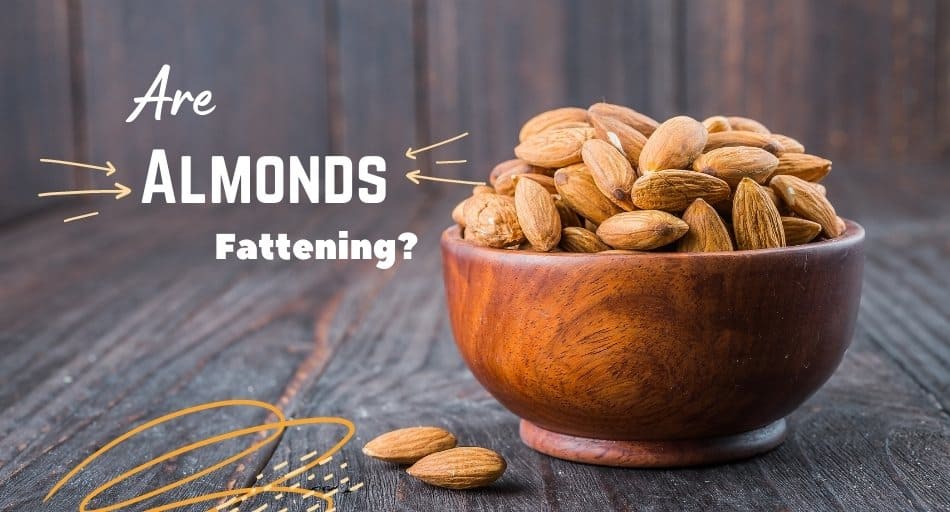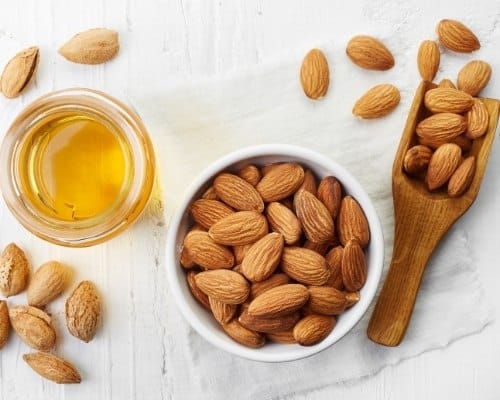When trying to lose weight, it's essential to know the nutritional and caloric values of common foods and ingredients.

That way, you can plan how much you will eat and what foods you should consume. However, some foods are calorie-dense, making them bad food choices for a weight loss diet.
Therefore, it's important to know them to make educated choices. For example, are almonds fattening?
Table of Contents
Are almonds fattening?
Almonds are very caloric, and thus if consumed in high quantities, they can be fattening. Nevertheless, studies have shown that almonds are healthy for weight loss and make for a good snack on these diets. They contain healthy fats and many other nutrients that make them good food that's not too fattening if consumed consciously.
How many calories do almonds have?
A 1-ounce serving (28 g) of almonds contains 164 calories. This makes them very calorie-dense. It's also very easy to overeat on almonds since they're delicious and small, making them a perfect snack food.
They also contain a lot of fiber, improving digestion and gut health. Their fat content is relatively high, and that's where most of their calories come from.

However, almonds contain healthy fats that come with many health benefits.
While it might seem illogical that high-calorie foods are healthy and don't promote weight gain, it's important to remember that all calories are not the same. For example, eating almonds, even though they're caloric, is way better than eating burgers.
Almonds also provide you with many minerals and vitamins, so it's a great idea to eat more of them.
What's more, they're incredibly delicious and don't contain any substances that can aggravate any health conditions, such as GERD or acid reflux.
Nutritional Facts: Almonds (3.5 oz/100 g)
- 579 Calories
- Total Fat 49.9 g
- Saturated fat 3.8 g
- Sodium 1 mg
- Potassium 705 mg
- Total Carbohydrate 21.6 g
- Dietary fiber 12.5 g
- Sugar 4.4 g
- Protein 21.2 g
- Vitamin C 0% DV
- Calcium 26% DV
- Iron 29% DV
- Vitamin D 0% DV
- Vitamin B6 11% DV
- Magnesium 75% DV
Are almonds healthy?
Almonds are very healthy and pack a punch of vitamins, minerals, and nutrients. They are particularly high in vitamin E, providing you with 37% of your daily recommended need for this vitamin in just one serving.
Vitamin E is a powerful antioxidant that helps remove free radicals from your body and slow down the aging process. It also helps maintain proper metabolic functions and control how your organs function.
These nuts are also rich in manganese, containing 32% of your daily need for this mineral. Manganese contributes to many bodily functions, such as the metabolism of amino acids, cholesterol, glucose, and carbs.
It's also very important in blood clotting, bone formation, and reducing inflammation. However, your body only requires small amounts of this trace mineral, so consuming some almonds is an excellent idea to fill up on this nutrient.

Another mineral that almonds are rich in is magnesium. It helps keep your muscles healthy and prevent cramps, especially after working out.
So, it's important to have enough of this mineral when training and trying to lose weight. It will also help keep your electrolyte levels balanced, improving hydration.
Furthermore, the antioxidants included in almonds (mostly in their brown skin, so blanched almonds aren't as healthy) help protect your cells from oxidative stress.
It can damage your cells, causing inflammation, aging, and many diseases like cancer. Antioxidants are also essential if you're trying to lose weight or keep your weight stable over time.
Almonds can help you:
- Lose weight
- Boost your brain activity
- Skin care
- Reduce heart attack risk
- Make your bones strong
- Lower bad cholesterol
- Help feel better during pregnancy
- Reduce the risk of cancer
Are almonds bad for weight loss?
Almonds contain several nutrients that your body finds hard to break down and digest. Because of that, your body doesn't take in around 15% of the calories in almonds.
Some research also suggests that consuming all types of nuts can boost metabolism, thus speeding up how fast your body burns fat.
In addition, it's very easy to add almonds to your diet. You can eat a handful as a snack (but make sure not to overdo it), add them to salads, or throw some into your cereal during breakfast; the possibilities are endless.
What's more, almonds aren't high in carbohydrates, which means that they can be included on most diet plans, such as keto or low-carb, high-fat.
Almonds contain heart-healthy monosaturated fats that help make you feel full after a meal, preventing overeating.

In addition, healthy fats help control your appetite, leading to a healthy weight loss as opposed to losing too many pounds too fast.
Almonds can also help people with diabetes lose weight as they contain substances that don't cause spikes in your blood sugar levels.
Although almonds are healthy, it's important to note that it's still possible to gain weight while eating them.
They are incredibly healthy in moderation, but they are rich in calories. So, make sure to control how much almonds you consume to keep a healthy, balanced diet.
Is almond milk less fattening than almonds?
Almond milk is less in calories than almonds. It's also much harder to drink too much almond milk than it is to consume too many almonds.
Both are very healthy, containing many essential nutrients. Hence it's a good idea to incorporate both into your diet.
Almond milk is less fattening than almond when consumed in high quantities, so it's safe to drink it often.

Almond butter is yet another food product derived from almonds. It's an alternative to peanut butter (especially for those allergic), and it's very healthy.
However, since it consists of mashed almonds, it's very high in calories. As a result, it's best to limit your consumption of almond butter if your goal is weight loss.
Furthermore, since a diet that includes many foods rich in healthy fats has been proven to help you lose fat, it's also good to replace your regular cooking oil with almond oil.
Adding almond oil to your diet — either in salads, while cooking, or baking — is a good idea to increase your intake of healthy fats. On top of that, almond oil is way more nutritious than sunflower or vegetable oil.
Conclusion
Almonds are very calorie-dense and contain a lot of fat. Despite that, almonds have been proven to aid weight loss and promote healthy eating habits.
By filling you up, they prevent overeating and keep you healthy. After all, it's important that even if a food is high in calories, it doesn't mean that it's not healthy.
